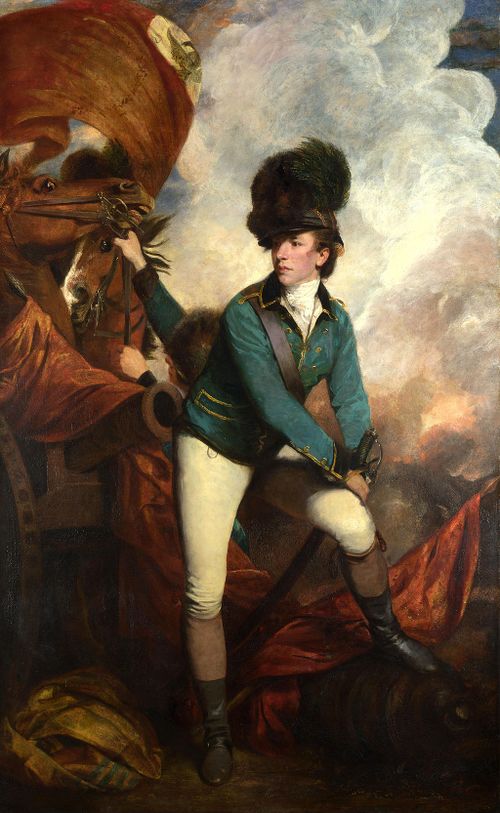Annotation:Colonel Tarleton's Quick March: Difference between revisions
(Created page with "__NOABC__ <div class="noprint"> <p><font face="sans-serif" size="4"> Back to [[{{BASEPAGENAME}}]] </font></p> </div> ---- {{#lst:{{PAGENAME}}|abc}} ---- <div style="page-break...") |
No edit summary |
||
| Line 10: | Line 10: | ||
<div style="text-align: justify; direction: ltr; margin-bottom: 90px; margin-left: 70px; margin-right: 120px;"> | <div style="text-align: justify; direction: ltr; margin-bottom: 90px; margin-left: 70px; margin-right: 120px;"> | ||
<br> | <br> | ||
'''COLONEL TARLETON'S QUICK MARCH'''. English, March (6/8 time). D Major. Standard tuning (fiddle). AABB. The march honors British solder and M.P. Banastre Tarleton (1754-1833), hero or villain (depending on your point of view) of the American Revolution, where he commanded British loyalists and regular troops with skill and sometimes ruthlessness. By the end of the war he had been promoted to the rank of Lieutenant Colonel based on his abilities, not due to purchased ranks. After he returned to England where he became M.P. for Liverpool, a post he retained every year save one until 1812. As M.P. he supported the Whig party, but was also an ardent supporter of the slave trade, as a result of his mercantile Liverpool family roots and connections. | '''COLONEL TARLETON'S QUICK MARCH'''. English, March (6/8 time). D Major. Standard tuning (fiddle). AABB. The march honors British solder and M.P. Banastre Tarleton (1754-1833), hero or villain (depending on your point of view) of the American Revolution, where he commanded British loyalists and regular troops with skill and sometimes ruthlessness. By the end of the war he had been promoted to the rank of Lieutenant Colonel based on his abilities, not due to purchased ranks. After he returned to England where he became M.P. for Liverpool, a post he retained every year save one until 1812. As M.P. he supported the Whig party, but was also an ardent supporter of the slave trade, as a result of his mercantile Liverpool family roots and connections. [[File:tarleton.jpg|500px|thumb|left|Banastre Tarleton, c. 1782 by Sir Joshua Reynolds. He is in the uniform of the British Legion, his troop of irregulars. He introduced the style of leather helmet he wore to the British Army, were it remained in service with artillery troops until the end of the Napoleonic wars.]]<br> | ||
<br> | |||
</div> | </div> | ||
</font></p> | </font></p> | ||
Revision as of 16:25, 19 May 2019
X:1 T:Colonel Tarleton's Quick March M:6/8 L:1/8 R:March B:Neil Stewart – “Select Collection of Scots, English, Irish and Foreign B:Airs, Jiggs & Marches, vol. 1” (1784, p. 6, No. 11) Z:AK/Fiddler’s Companion K:D f/g/|a>ba agf|bc'd' a2^a|bgf efd|d3 c2 f/g/| a>baa gf|b>c'd' a2^a|be afd|fge d2:| |:c/d/|e2c A2 f/g/|a2f d2 b/c'/|d'cb c'2b|c'>d'b a2^a| b2g egb|a2f dfa|b>c'd' agf|{fg}a>gf e2 f/g/| a>baa gf|b>c'd' a2^a|bgf efd|d3 c2 f/g/| a>baa gf|b>c'd' a2^a|bge afd|fge d2:|]

